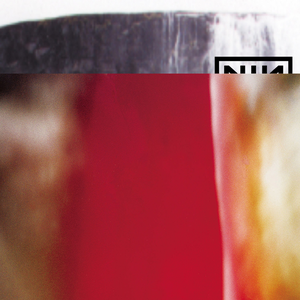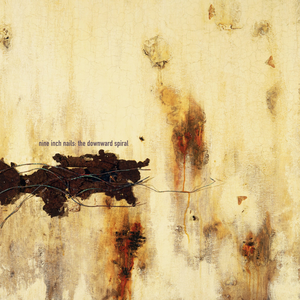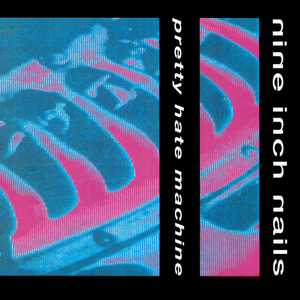Zoek artiesten, songs en albums op in onze database.
- The Fragile (2008)
- Somewhat Damaged
- The Day the World Went Away
- The Frail
- The Wretched
- We're in This Together
- The Fragile
- Just Like You Imagined
- Even Deeper
- Pilgrimage
- No, You Don't
- La Mer
- The Great Below
- The Way Out Is Through
- Into the Void
- Where Is Everybody?
- The Mark Has Been Made
- Please
- Starfuckers, Inc.
- Complication
- I'm Looking Forward to Joining You, Finally
- The Big Come Down
- Underneath It All
- Ripe (With Decay)
- The Downward Spiral (2009)
- Mr. Self Destruct
- Piggy
- Heresy
- March of the Pigs
- Closer
- Ruiner
- The Becoming
- I Do Not Want This
- Big Man With a Gun
- A Warm Place
- Eraser
- Reptile
- The Downward Spiral
- Hurt
- Pretty Hate Machine (2011)
- Head Like a Hole
- Terrible Lie
- Down In It
- Sanctified
- Something I Can Never Have
- Kinda I Want To
- Sin
- That's What I Get
- The Only Time
- Ringfinger

The Fragile (also known as Halo 14) is a concept double album by American Industrial rock act Nine Inch Nails, released in 1999 on Reznor's Nothing Records. The album is Nine Inch Nails' fourth major label release and the fourteenth halo. The album continues the plot of The Downward Spiral, despite the complete change in sound and style of the album. Instead of heavily distorted instruments, and gritty industrial sounds, the album relies much more on soundscapes, electronic beats, ambient noise, and heavy metal-laden guitar, such as in the single "Starfuckers, Inc." Trent Reznor describes the album's plot and story as "a theme of things falling apart." Reznor has also said the album is bleaker than The Downward Spiral, despite the more aggressive, depressing tone of that album. Many songs on the album borrow bass, guitar, and keyboard lines from other songs on the album; most notably "The Frail" piano becoming "The Fragile" guitar and the bassline used in "La Mer" reappearing in "Into the Void". The album was not as much of a commercial success as The Downward Spiral, most likely accredited to Interscope Records' lack of promotion of the album, and the lack of a stand-out single.[original research?] Despite a strong start at #1 on the Billboard Top 10, the album quickly slipped out of the Billboard Top 10 only a week after its release, and Reznor was forced to provide funding for the subsequent North American tour out of his own pocket. The cover artwork was designed by David Carson. The first single, "The Day the World Went Away", was released two months before the album. "Into the Void" and "We're in This Together" proved to be the album's most successful singles. The B-side track "Starfuckers, Inc." was released on the album as a track at the last minute, and became The Fragile's last single. Reznor described The Fragile in a 1999 interview: "There's a general theme to the album of systems failing and things sort of falling apart. In keeping with the idea of making everything sound a little broken, I chose stringed instruments because they're imperfect by nature. Although it may not sound like it, most of the album is actually guitar - and that includes the orchestral sounds and weird melodic lines. When it came to instruments that I didn't really know how to play - like the ukulele or the slide guitar - we were able to get some really interesting sounds by making the studio the main instrument." Read more on Last.fm.

The Downward Spiral (also known as Halo 8) is the third major release by American Industrial rock act Nine Inch Nails, released in 1994 on Reznor's own Nothing Records (a vanity label of Interscope Records). "Halo 8" of the official Nine Inch Nails halo releases, it is a concept album detailing the destruction of an undisclosed man; from the beginning to his climatic suicide. The album was a major commercial success that secured Nine Inch Nails as a force in the 1990s music scene, in particular following the release of the single "Closer" and its controversial video. To record the album, Reznor rented the house located at 10050 Cielo Drive in Beverly Hills, California where actress Sharon Tate was murdered by members of the Manson Family in 1969. Reznor built a studio space in the house which he named Le Pig, after the message that was scrawled on the front door with Tate's blood by her murderers. Reznor told Entertainment Weekly that despite the notoriety attached to the house, he chose to record there because, "I looked at a lot of places, and this just happened to be the one I liked most." Reznor moved out of the house in December 1993, after he said "there was too much history in that house for me to handle." After the album's recording, Trent Reznor consulted with the landlords and had the house demolished shortly after. Reznor made a statement about working in the Tate house during a 1997 interview with Rolling Stone: “ While I was working on Downward Spiral, I was living in the house where Sharon Tate was killed. Then one day I met her sister. It was a random thing, just a brief encounter. And she said: 'Are you exploiting my sister's death by living in her house?' For the first time, the whole thing kind of slapped me in the face. I said, 'No, it's just sort of my own interest in American folklore. I'm in this place where a weird part of history occurred.' I guess it never really struck me before, but it did then. She lost her sister from a senseless, ignorant situation that I don't want to support. When she was talking to me, I realized for the first time, 'What if it was my sister?' I thought, 'Fuck Charlie Manson.' I went home and cried that night. It made me see there's another side to things, you know? ” Reznor set out to make an album that was a departure from the 1992 Broken EP, emphasizing "mood, texture, restraint and subtlety." He brought in a number of guest performers to record, including former Jane's Addiction and Porno for Pyros drummer Stephen Perkins and progressive rock guitarist Adrian Belew. Perkins played a number of drum parts that were recorded live in the studio; these tracks were in turn turned into sample loops. Reznor took a similar approach to recording guitar parts. Reznor would record 20 to 25-minute long sessions of himself playing guitar on a hard disc recorder with a Studio Vision sequencer, then would cut out parts of the recording he found interesting for later use. Reznor said, "99 percent of the stuff we do–even vocals–is recorded into the computer [hard disk] first. We get an arrangement together and then dump it to tape." Read more on Last.fm.

Pretty Hate Machine is the debut album by American industrial rock act Nine Inch Nails, released October 20, 1989, on TVT Records. The album was out of print from around 1997 to 2005 due to the much publicized falling out between Nine Inch Nails' core member, Trent Reznor, and the original publishing label of the album, TVT Records. Rykodisc re-released the album around the world in 2005. Pretty Hate Machine is compiled of tracks from the Purest Feeling demo, as well as tracks recorded after the Purest Feeling recording. The album spawned three singles, the most successful being "Head Like a Hole", which has become a staple in Nine Inch Nails' live performances. A remastered version was issued on November 22, 2010. History Working nights at Right Track Studio as a handyman and janitor, Reznor used studio "down-time" to record and develop his own music. Playing most of the keyboards, drum machines, guitars, and samplers himself, he recorded a demo. The sequencing was done on a Macintosh Plus. Teaming up with manager John Malm, Jr., they sent the demo to various record labels. Reznor received serious offers from many of them, but eventually signed a deal with TVT Records who, until then, were known mainly for releasing novelty and television jingle records. Pretty Hate Machine was recorded in various studios around the world with Reznor collaborating with some of his most idolized producers: Flood, Keith LeBlanc, Adrian Sherwood, and John Fryer. Much like his recorded demo, Trent Reznor refused to record the album with a conventional band, recording Pretty Hate Machine mostly by himself. Released on October 20, 1989, the album was a critical and commercial success, receiving radio airplay for the singles "Down in It", "Head Like a Hole" and "Sin". The songs "Terrible Lie" and "Something I Can Never Have" also received moderate airplay along with the three lead singles. Pretty Hate Machine also gained popularity through word-of-mouth and developed an underground following. Reznor quickly hired a band for touring with The Jesus and Mary Chain, including guitarist and future Filter frontman Richard Patrick. Nine Inch Nails' live set during the time was known for louder, more aggressive versions of the studio songs, and also for destroying their instruments at the end, (Reznor preferred using the heel of his boots to strip the keys from expensive keyboards, most notably the Yamaha DX7). Since the album was released, a recording known as Purest Feeling surfaced. This bootleg album contains the original demo recordings of most of the tracks found on Pretty Hate Machine, as well as a couple that were not used ("Purest Feeling", "Maybe Just Once" and an instrumental intro to "Sanctified" called "Slate"). Pretty Hate Machine went out of print through TVT Records, but was reissued by Rykodisc on November 22, 2005 with slight changes in the packaging. Reznor had expressed an interest in creating a "deluxe edition" with surround sound remastering and new/rare remixes, similar to the re-release of The Downward Spiral. Rykodisc liked the idea, but wanted Reznor to pay them to handle the process of remastering, repackaging, and re-releasing the album. On March 29th, 2010, the master recording rights of Pretty Hate Machine were acquired by The Bicycle Music Company, and on October 22nd, 2010, Trent Reznor announced on nin.com that on November 22nd, 2010, a remastered issue of the album would be released by UMe and The Bicycle Music Company. The re-release includes slightly different cover art by Rob Sheridan and the bonus track "Get Down, Make Love", a Queen cover originally found on the "Sin" single. Leading up to the re-release of the album, a website was put up for fans at http://phm.nin.com/, featuring content from videos and tours for Pretty Hate Machine. The videos for "Head Like a Hole" and "Down in It" featured newly remastered sound, the uncut video for "Sin" (a remix for the video was used, so it was not remastered) and two early live video segments; one with interviews. Track listing All songs written and composed by Trent Reznor. 1. "Head Like a Hole" Trent Reznor, Flood 4:59 2. "Terrible Lie" Trent Reznor, Flood 4:38 3. "Down in It" Trent Reznor, Keith LeBlanc, Adrian Sherwood 3:46 4. "Sanctified" Trent Reznor, John Fryer 5:48 5. "Something I Can Never Have" Trent Reznor, John Fryer 5:54 6. "Kinda I Want To" Trent Reznor, John Fryer 4:33 7. "Sin" Trent Reznor, John Fryer, Keith LeBlanc 4:06 8. "That's What I Get" Keith LeBlanc, John Fryer 4:30 9. "The Only Time" Trent Reznor, John Fryer, Keith LeBlanc 4:47 10. "Ringfinger" Trent Reznor, John Fryer 5:40 11. "Get Down, Make Love" (Queen cover, bonus track on 2010 reissue only) Al Jourgensen (credited as Hypo Luxa) 4:19 Total length: 48:41 Notes Some of the lyrics printed in the booklet are not heard in the songs. The bands listed in the liner notes (Prince, Jane's Addiction, and Public Enemy, amongst others) were sampled on the album. Parts of Prince's "Alphabet St." and Jane's Addiction's "Had a Dad" are prominently heard in "Ringfinger", while other samples were either edited or distorted to be unrecognizable, such as the intro to "Kinda I Want To". John Fryer's name is misprinted as John Fruyer. The 2010 remastered issue was mastered by Tom Baker at Precision Mastering in Hollywood, California. A speech from the film Midnight Express was sampled at very low volume during the music break in "Sanctified". On the 2010 reissue of the album, this sample is no longer present. Trent Reznor – vocals, arranger, programming, producer, engineer, digital editing, mixing, song writer Chris Vrenna – programming, digital editing Doug d'Angelis – engineer Tony Dawsey – mastering Flood – programming, producer, engineer John Fryer – producer, engineer, mixing Kennan Keating – engineer Keith LeBlanc – producer, engineer, remixing, mixing Richard Patrick – guitar (drone guitar at the end of "Sanctified") Ken Quartarone – engineer Adrian Sherwood – producer, engineer, mixing Jeffrey Silverthorne – photography Gary Talpas – cover design 2010 Remaster Tom Baker - Mastering Trent Reznor - Mastering Get Down Make Love (Bonus Track): Trent Reznor - performer & engineer Al Jourgensen - producer, intro samples & engineer Jeff "Critter" Newell - engineer Sean Beaven - engineer Freddie Mercury - song writer (originally performed by his band Queen) Chart history Album Year Title Chart Position 1990 Pretty Hate Machine Billboard 200 No. 75 Singles Year Title Chart Position 1989 Down in It Hot Dance Music/Club Play No. 16 1989 Down in It Hot Dance Music/Maxi-Singles Sales No. 20 1989 Down in It Modern Rock Tracks No. 16 1990 Head Like a Hole Hot Dance Music/Club Play No. 17 1990 Head Like a Hole Hot Dance Music/Maxi-Singles Sales No. 34 1990 Head Like a Hole Modern Rock Tracks No. 28 1990 Sin Hot Dance Music/Club Play No. 10 1990 Sin Hot Dance Music/Maxi-Singles Sales No. 13 Read more on Last.fm.